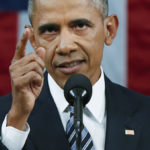PRESIDENT Barack Obama has extended for another year, sanctions the United States imposed against Zimbabwe, saying the regime in Harare continues to represent “an unusual and extraordinary threat to the foreign policy of the United State”.
Washington imposed the sanctions in 2003, reacting to allegations of gross human rights abuses and electoral fraud levelled against President Robert Mugabe’s administration.
“These actions and policies had contributed to the deliberate breakdown in the rule of law in Zimbabwe, to politically motivated violence and intimidation in that country, and to political and economic instability in the southern African region,” read then President George W Bush’s Executive Order of March 6, 2003, which effected the sanctions and has been renewed every year since.
Equally punitive action was also taken by countries such as Australia, Canada and the European Union (EU) with Mugabe hitting back by saying the West was punishing him for taking land from a handful of white farmers and giving it to hundreds of thousands of black Zimbabweans.
The EU has since lifted most of its sanctions and also resumed financial support for the struggling Harare government.
But Obama said that Mugabe had not changed his ways since 2003 and so US sanctions would be extended for another year.
“I have sent to the Federal Register for publication the enclosed notice stating that the national emergency originally declared in Executive Order 13288 of March 6, 2003, and renewed every year since then, is to continue in effect beyond March 6, 2016,” said the US president in a statement.
“The threat constituted by the actions and policies of certain members of the Government of Zimbabwe and other persons to undermine Zimbabwe’s democratic processes or institutions, contributing to the deliberate breakdown in the rule of law, to politically motivated violence and intimidation, and to political and economic instability in the southern African region, has not been resolved.
“These actions and policies continue to pose an unusual and extraordinary threat to the foreign policy of the United States. For these reasons, I have determined that it is necessary to continue this national emergency and to maintain in force the sanctions to respond to this threat.
The sanctions target Mugabe and leading members of his retinue, along with several government and quasi-State institutions.
Global financial institution, Barclays bank, recently revealed that it was fined about $2.5 million for contravening the US sanctions against Zimbabwe.
The US treasury department said Barclays processed 159 transactions worth $3.4 million from July 2008 to September 2013 to or through financial institutions in the US for corporate customers of Barclays Bank of Zimbabwe that were majority-owned by people on Washington’s sanctions lists.
“This enforcement action highlights the importance for institutions with operations in countries with a significant presence of persons (individuals and entities) on the [sanctions lists] to take appropriate measures to ensure compliance with U.S. economic sanctions laws when processing transactions on behalf of their customers to, through, or within the US,” said the treasury department.
President Robert Mugabe blames the sanctions for Zimbabwe’s economic crisis which has lasted more than a decade despite the now 92-year-old leader pivoting East and actively seeking financial lifelines from liberation war allies China and Russia.







